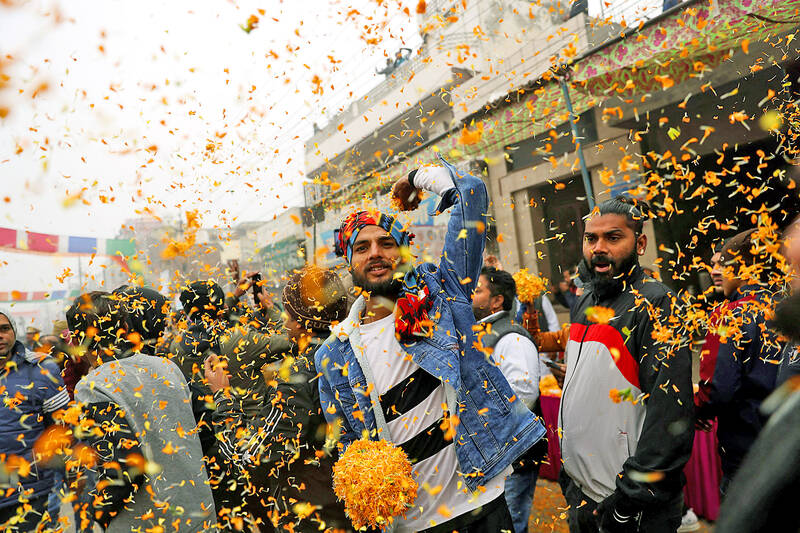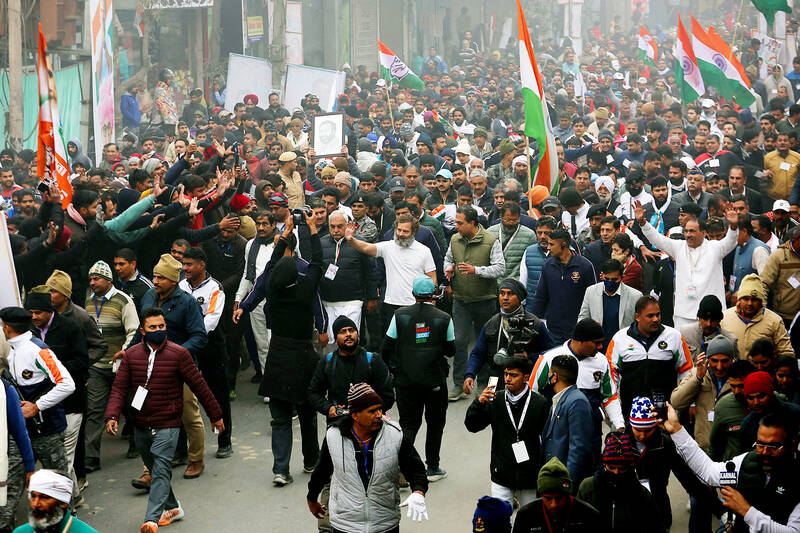An old Bollywood film song playing on loop exhorted travelers to keep walking as opposition leader Rahul Gandhi and an entourage marched through northern India’s Panipat on a frigid morning last week, trailed by hundreds of people.
Gandhi began walking the length of the country more than 100 days ago from India’s southern tip, hoping to repair the battered image of his Indian National Congress party and take on Indian Prime Minister Narendra Modi’s dominant Bharatiya Janata Party (BJP).
Stopping to greet onlookers and holding public meetings, Gandhi plans to round off his march in northernmost Kashmir by the end of the month.

Photo: Reuters
“Long live Rahul Gandhi,” Congress party supporters shouted, as the scion of a dynasty that has given India three prime ministers marched through Panipat on his Bharat Jodo Yatra, or “Unite India March.”
The 52-year-old, a fitness buff with a thick salt-and-pepper beard, walks about 25km per day, stopping for the night in a trailer van that moves with him.
Gandhi’s grueling march that is to cover about 3,500km is a throwback to the padayatras or foot journeys through the rural heartland by past leaders, including independence hero Mahatma Gandhi nearly a century ago. The two Gandhis are not related.

Photo: Reuters
This modern version of the march gives hundreds of thousands of people face time with a leader who has seemed distant and aloof in the past. Congress is hoping that the crowds Rahul Gandhi is attracting will eventually translate into votes.
“Now that he has hit the streets, people can see who he is,” said Dharamvir Arya, a 55-year-old farmer who had come to see Rahul Gandhi in Panipat. “If he remains in a bungalow, hidden, how will people know what he is like?”
Polling agency CVoter, which has tracked Gandhi’s approval ratings in nine states — four of which would hold local elections this year — as part of nationwide monthly surveys of 30,000 respondents, found the Congress leader’s popularity has risen markedly in most states through which he has marched.
In the southern state of Karnataka, which is to hold elections this summer, the percentage of respondents satisfied with Rahul Gandhi has risen from 39 percent in January last year to nearly 58 percent immediately after the march passed through.
The once-dominant Congress controls less than 10 percent of the elected seats in parliament’s lower house and has been devastated in two successive general elections by the BJP, most recently in 2019 under Rahul Gandhi’s leadership.
Modi remains India’s most popular politician by a substantial margin and is widely expected to win a third victory next year.
More than 60 percent of respondents across the country prefer Modi as prime minister to 30.3 percent choosing Rahul Gandhi, CVoter said.
Analysts say that Gandhi’s public image is improving, but it might not be enough for the flagging Congress to immediately convert that into electoral success.
“To invest in Rahul Gandhi’s personal popularity is actually a fairly astute move,” said Neelanjan Sircar, a senior fellow at the Centre for Policy Research think tank in New Delhi.
“Does it yield electoral dividends? That, I think, is unlikely,” Sircar said, pointing to the BJP’s superior organizational abilities and formidable election machinery.
Rahul Gandhi declined interview requests from Reuters.
Indian Lawmaker Digvijay Singh, a senior Congress leader, admitted the party had ceded space as an effective opposition, a function Rahul Gandhi’s march was now fulfilling.
“It is important, it is crucial,” Singh said.
Long seen by critics as a reluctant politician without the earthy skills to take on Modi, Rahul Gandhi’s cross-country march has also provided him a platform to hold the BJP to account on issues such as communal polarization brought by its muscular Hindu nationalist agenda, unemployment and inflation.
“The aim is to stand up against the fear, hatred and violence that is being spread in the country,” Rahul Gandhi told reporters late last month. “I think the march has been quite successful till now, and it has achieved more than we expected.”

POLITICAL PRISONERS VS DEPORTEES: Venezuela’s prosecutor’s office slammed the call by El Salvador’s leader, accusing him of crimes against humanity Salvadoran President Nayib Bukele on Sunday proposed carrying out a prisoner swap with Venezuela, suggesting he would exchange Venezuelan deportees from the US his government has kept imprisoned for what he called “political prisoners” in Venezuela. In a post on X, directed at Venezuelan President Nicolas Maduro, Bukele listed off a number of family members of high-level opposition figures in Venezuela, journalists and activists detained during the South American government’s electoral crackdown last year. “The only reason they are imprisoned is for having opposed you and your electoral fraud,” he wrote to Maduro. “However, I want to propose a humanitarian agreement that

ECONOMIC WORRIES: The ruling PAP faces voters amid concerns that the city-state faces the possibility of a recession and job losses amid Washington’s tariffs Singapore yesterday finalized contestants for its general election on Saturday next week, with the ruling People’s Action Party (PAP) fielding 32 new candidates in the biggest refresh of the party that has ruled the city-state since independence in 1965. The move follows a pledge by Singaporean Prime Minister Lawrence Wong (黃循財), who took office last year and assumed the PAP leadership, to “bring in new blood, new ideas and new energy” to steer the country of 6 million people. His latest shake-up beats that of predecessors Lee Hsien Loong (李顯龍) and Goh Chok Tong (吳作棟), who replaced 24 and 11 politicians respectively

Young women standing idly around a park in Tokyo’s west suggest that a giant statue of Godzilla is not the only attraction for a record number of foreign tourists. Their faces lit by the cold glow of their phones, the women lining Okubo Park are evidence that sex tourism has developed as a dark flipside to the bustling Kabukicho nightlife district. Increasing numbers of foreign men are flocking to the area after seeing videos on social media. One of the women said that the area near Kabukicho, where Godzilla rumbles and belches smoke atop a cinema, has become a “real

‘POINT OF NO RETURN’: The Caribbean nation needs increased international funding and support for a multinational force to help police tackle expanding gang violence The top UN official in Haiti on Monday sounded an alarm to the UN Security Council that escalating gang violence is liable to lead the Caribbean nation to “a point of no return.” Special Representative of the UN Secretary-General for Haiti Maria Isabel Salvador said that “Haiti could face total chaos” without increased funding and support for the operation of the Kenya-led multinational force helping Haiti’s police to tackle the gangs’ expanding violence into areas beyond the capital, Port-Au-Prince. Most recently, gangs seized the city of Mirebalais in central Haiti, and during the attack more than 500 prisoners were freed, she said.